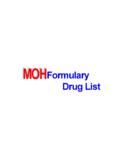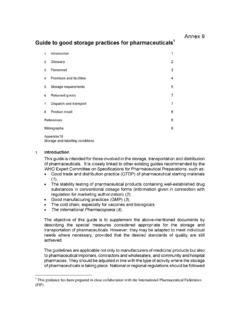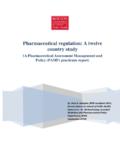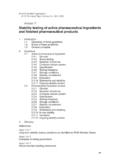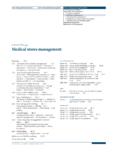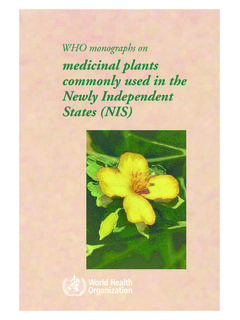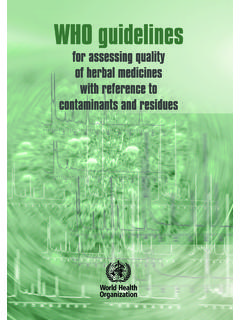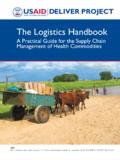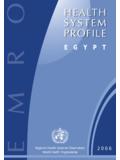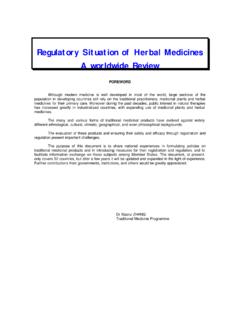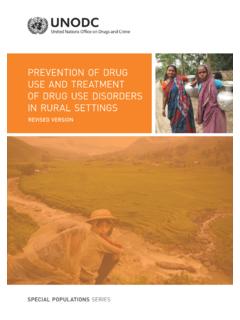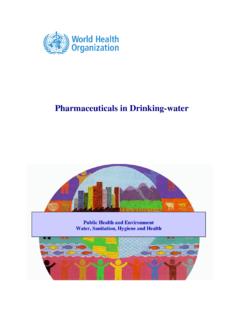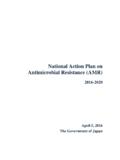Transcription of Irrational Prescribing - WHO
1 Directorate General of PharmacyFederal Ministry of Health Sudan Journal of Rational Use of Medicine March 2014 - Issue JIrrational PrescribingPublication teamEditor in chief Nuha Mohamed A. Agabna B. Pharm., M. Pharm., Prof. Awatif Ahmed Osman B. Sc. N, N., Prof. Ali Mohamed Arabi MBBS. MD. Randa Alsadig Alsaddig BSC. MSc. Clinical Phamacy Elkhatim Elyas Mohamed MBBS. MCOMH. Diploma Thoracic Med. Habab Khalid El Kheir B. Pharm., M. Pharm., Ghada Omar Shouna B. Pharm., MSc Clinical Phamacy Alya Faysal AL-Mahdi B. Pharm., M. Pharm., Duria Hassan Merghani B. Sc. N, N., Yasir Mirghani Abdalrahman B.
2 Pharm. Sawsan Eltaher Ahmed B. Design Mahmoud Gahalla AhmedAdvisory board Prof. Sami Ahmed Khalid B. Pharm., M. Pharm., Prof. Abdalla O. Elkhawad B. Pharm., M. Pharm., Mohamed A. Zeinelabdin B. Pharm., M. Journal for Rational Use of Medicine (SJRUM) is a quarterly publication produced by the National Medicine Information Center and Reference Library (NMICRL); Directorate General of Pharmacy; Federal Ministry of Health; Sudan. SJRUM is funded by Global Fund and technically supported by the World Health Organization. The first issue was published in September 2012. SJRUM aims to promote Rational Use of Medicines (RUM) through disseminating principles, views, news, and educating health providers about rational use of medicines.
3 SJRUM targets health professionals; prescribers, pharmacists, and nurses. Each issue is centered on a theme; which usually is an important subject in RUM. SJRUM highlights in each issue the current situation in Sudan relevant to the theme, presented either by evidence from local research or with reliable anecdotal evidence. SJRUM includes research studies which aim to encourage young researchers to publish their work at national and international levels. SJRUM also includes a section for educational materials relevant to RUM relying mostly on the WHO educational materials and other reliable sources. The section of news reflects some important published news that may affect RUM practice. SJRUM includes some selected case studies, reflecting current practice at different health facilities in Sudan, so as to highlight the Irrational aspects in order to overcome them.
4 As part of NMICRL activities, medical students and the public are endowed with leaflets and fliers on selected topics of have the freedom to use and reproduce any part of this journal. For participation please contact: more information ..You can access SJRUM online on AcknowledgementThe Directorate General of Pharmacy gratefully acknowledges the financial support of the Global Fund to fight against HIV/AIDS, Tuberculosis and Malaria. This work would not have been possible without technical support of World Health Organization. Sudan Journal of Rational Use of MedicineContents1 Contents2 Editorial3 Where Are We?4 Current Topic6 Irrational PrescribingPractice Issues Problems Caused by Donations of Antibiotics: The Need for an Antibiotic Policy Patients' Education is the Solution Serotonin Syndrome Disastrous-Umbrella Therapy !
5 !1012 Guidelines Typhoid Fever (Enteric Fever)Research Articles Evaluation of Brochures of Pharmaceutical Companies in Omdurman Private Clinics Prescribing Patterns in National Health Insurance Fund Health Care Centres In South Kordofan State November 201116 News17 Useful Tips How to Use Turbuhaler 18202122 Focus Medical Education: Where are we going to?Questions and AnswersSuccess Stories The Central Medical Supplies Public Corporation (CMS): A New EraEducational Materials Rational Prescribing Common Cold Treatment in Children The super bug Sudan Journal of Rational Use of MedicineDear fellows and readersWelcome to the 7th issue of are pleased to present to you our 7th issue of SJRUM, which comes under the theme of Irrational medicines' Prescribing . The issue includes articles, research, and case studies revolving around the theme. Financial implications on Irrational Prescribing are given, beside educational material that is informative and may help professionals use medicines reach many stakeholders, and disseminate knowledge about RUM, the NMICRL, beside the SJRUM, made a TV show on the theme of the previous issue self-medication with emphasis on antibiotics and pain killers.
6 Preparation for the forthcoming workshop on Irrational use of medicines is underway. It is anticipated that the workshop will contribute to raising the awareness about the would like to encourage our readers to contribute to the coming issues. For information see the guide to authors or go to Your comments and views are welcomed. 2 Sudan Journal of Rational Use of MedicineDr. Nuha M. AgabnaEditorial3 Factors PatientsPrescribers/DispensersHealth system Patient/relatives demands / expectations. Wrong health beliefs. Cultural practices. Lack of health education. Inadequate knowledge and skills. Lack of evidence-based practice on medicines . Pressure to prescribe/ dispense. Lack of medication information. Lack of Continuous Professional Development (CPD). Work place - heavy patient load. Lack of enforced regulations. Pressure of promotional activities Lack of coordination.
7 Discripency of lab results. Lack of supervision and accountability. Lack of monitoring and evaluation. Sudan Journal of Rational Use of MedicineWhere are we from: Irrational Prescribing . compliance with guidelines (60%) of antibiotics and injections (73%) : use of too many medicines without justified of public and personal patient confidence in health stock of antimicrobial resistance (73%) WHO, Rational use of medicines, Fact sheet N 338 May 2010 available from: , accessed March 2014. 2. Assessment of national pharmaceutical sector North Sudan 2007,MOH, DGoP. 3. Awad A., , MatoweL. Thalib L, Self-medication with antibiotics and antimalarials in the community of Khartoum state, Sudan. 2005. Available from: ~csps/JPPS8(2) , accessed March Amal M, Salma,M, Antibiotic resistance of common uropathogens among community and hospitalized adult patients at Omdurman Teaching Hospital.
8 BSc dissertation, Ahfad University for Managing access to medicines and health technology, MSH, 2012 chapter 27, available from: , accessed March 2014. Badereldin S. Hagnour Sudan Journal of Rational Use of MedicineCurrent Topic4 Sudan Journal of Rational Use of MedicineRational use of medicines has been defined by the World Health Organization WHO in 1985 as: "Rational use of drugs requires that patients receive medications appropriate to their clinical needs, in doses that meet their own individual requirements for an adequate period of time, and at the lowest cost to them and their community." This implies that, Irrational use of medicines includes all of the practices that make the mentioned processes of appropriate medicine Prescribing not fulfilled1. In other words, Irrational Prescribing can be described as the medically inappropriate and economically ineffective use of pharmaceuticals.
9 It is a commonly observed practice that occurs in both developed and developing countries, with enormous costs from the perspectives of the scarce resources and adverse clinical consequences2. It may occur in different forms; misuse, overuse, polypharmacy, adverse drug events or drug-drug interactions. Medication abuse describes a situation, when someone uses medicines very frequently that it becomes harmful, while medication misuse is simply, when someone doesn't use the medication correctly2. Using many medicines concomitantly is known as polypharmacy, which is defined as using 2-5 medicines simultaneously. However, patients with co-morbidities have a compelling need to use many medications to treat their multiple illnesses. Nevertheless, polypharmacy is associated with increased risk of medication related problems2 and increased risks of medications interactions, which can be caused by a seemingly innocuous combination of medicines and may result in heart attacks, stroke or even death3.
10 Irrational Prescribing may be manifested by the following examples: Prescribing of medicines when no medicine therapy is indicated, antibiotics for viral upper respiratory infections. The use of the wrong medicine for a specific condition requiring medication therapy, antibacterial in childhood diarrhea instead of ORS. The use of medicines with doubtful/unproven efficacy, use of antimotility agents in acute diarrhea. Failure to provide available, safe, and effective agents, failure to vaccinate against measles or tetanus. The use of correct medicines with incorrect administration, dosages, and duration, use of IV metronidazole when suppositories or oral formulations would be appropriate. The use of unnecessarily expensive medicines, use of a third generation, broad spectrum antimicrobial when a first-line, narrow spectrum, agent is factors can lead to Irrational Prescribing of medicines, the two mostly recognized are: availability of a large number of commercial preparations in the pharmaceutical market; which makes medication selection difficult for the prescriber.
